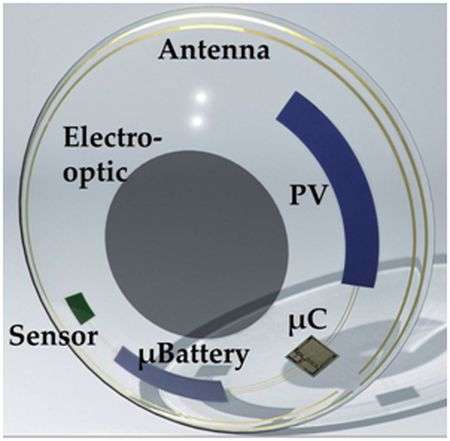December 9, 2016 weblog
Smart contact lens is discussed at electron devices meeting

(Tech Xplore)—Can we look at a future smart contact lens for those with eye problems? The iris, a key part of our eyes, modulates the amount of light reaching the retina, said researchers, and an estimated 200,000 individuals worldwide suffer from iris deficiencies.
These deficiencies bring discomfort and extreme photosensitivity, such as aniridia and leiomyoma.
Some early results in addressing these deficiencies were presented at IEEE's International Electron Devices Meeting this month. IEEE International Electron Devices Meeting (IEDM) is a forum for reporting breakthroughs in semiconductor and electronic device areas.
"An Active Artificial Iris Controlled by a 25-μW Flexible Thin-Film Driver" was presented by the group of researchers reporting on the lens, its components, and research results thus far.
Imec (a research institute in nanoelectronics and digital technologies) in Leuven, Belgium and university researchers have been exploring an artificial iris system built on a contact lens that may ameliorate some of these iris difficulties.
The researchers said it comprises an organic thin-film photovoltaic mini-module as a power supply/integrated illumination sensor; a flexible thin-film a-IGZO circuit as a driver chip; and a liquid crystal display which acts as the iris.
They reported that the system showed low power consumption for the driver chips (≥25μW) and that initial performance was promising.
Devin Coldewey writing in TechCrunch, said that while smart contact lenses have been treated by writers of science fiction for some time, "we're still waiting on them."
He said what was noteworthy about their effort was that it showed promised in advancing the technology—and also providing some therapeutic value.
As for tech advancements, Katherine Bourzac in IEEE Spectrum said that the artificial iris was part of a larger project on smart contact lenses led by Herbert De Smet, a professor at the University of Ghent. "De Smet's group is working on putting many electronic components onto these lenses, including batteries, antennas, control electronics, and chemical sensors."
As for people with eye injuries and other problems, this could help them too. Bourzac said, "it's difficult to see in low light when wearing sunglasses. And people with damaged irises may find that daylight is still too bright despite wearing tinted lenses. A contact lens that darkens to block out light and effectively constricts the pupil could help people to see better."
Coldewey said, "A contact lens that automatically changes its shade from totally transparent to as dark as a pair of sunglasses, as required by the ambient light, would fill this role nicely. That's exactly what De Smet's team has created."
De Smet is collaborating with De Roose and other researchers to make parts for the artificial iris system. Florian De Roose, a researcher at Imec (a research institution in nanoelectronics and digital technologies) in Leuven, Belgium.
In future systems, says De Roose in IEEE Spectrum, "the photovoltaics will act both as the light-level sensors and the LCD power source. "
Regarding the future, they see ample work ahead. "The lenses themselves are stretchy, but the transistors are merely flexible," said Bourzac. "The researchers will have to account for this mismatch, either by moving to stretchy materials or being very careful about the smart lens architecture."
Coldewey similarly summarized the research stages: "The parts are in place: the LCD-infused lens and the chip that controls it are solid, and the power system, a set of tiny photovoltaic cells, captures enough energy—but the two have yet to be integrated. Once they are, the lenses will still, of course, need to be tested for safety."
More information: An Active Artificial Iris Controlled by a 25-µW Flexible Thin-Film Driver, F. De Roose et al. IEEE International Electron Devices Meeting, 2016. ieee-iedm.org/session-32-optoe … rs-imaging-displays/
© 2016 Tech Xplore


















